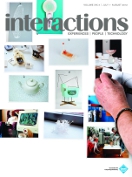Table of Contents
VOLUME XIX.4 July + August 2012
-
Demo Hour
-
Demo hour
Yaliang Chuang, Ling-Yuah Chiu, Jya-Cheng Hu, George Chang, Hsin-Liu Kao, Tsen-Ying Lin, Kuang-Shih Huang, Li-Erh Chang, Rung-Huei Liang, Tai-Wei Kan, Li-Te Yang, Shuang-Yu Tsai

A Shining Stage In recent years, more and more children are found to have learning or behavior problems when they enter school. Some of them are diagnosed as having had insufficient sensory experience in their early childhood. To prevent this kind of problem, it is important to provide proper…
-
-
Blogpost
-
Measuring usability in healthcare IT
Robert Schumacher, Kirsten Jerch

Recently, NIST released guidance NISTIR 7804, "Technical Evaluation, Testing and Validation of the Usability of Electronic Health Records," also known as the EHR Usability Protocol (EUP). The document is part of the NIST Health IT Usability initiative, which is focused on establishing a framework to define and assess the…
-
-
Departments
-
Community calendar 2012
CACM Staff
July 2012 IEEE ICALT 2012 - 12th International Conference on Advanced Learning Technologies and Technology-enhanced Learning (Rome, Italy) Conference Date: July 4-6, 2012 http://www.scuolaiad.it/ICALT2012/ IIHCI 2012 - 5th International Workshop on Intelligent Interfaces for Human-Computer Interaction (Palermo, Italy) Workshop Date: July 4-6, 2012 http://www.ihealthlab.icar.cnr.it/iihci2012/ UMAP 2012 - 20th International…
-
-
Columns
-
Never eat anything raw
Steve Portigal, Julie Norvaisas

Interviewing is based on asking questions. As children we all learned to ask questions (perhaps more than the adults around us were ready for!), but it takes work to become a skilled interviewerthe kind of interviewer with whom a natural exchange is almost inevitable and for whom asking questions…
-
Design, in the big and small
Jon Kolko

Designers, who for years have been called upon to design a single object or product, are now being asked to design entire systems, to explore experiences and emotion, and to take on large-scale social problemsso-called wicked problems. This requires a shift in skills, and with this shift has come…
-
-
Day in the Lab
-
STEIM
Takuro Lippit, Kristina Andersen

How do you describe your lab to visitors? We are a place where people make new instruments for live performances. You can call us a lab because we have engineers and researchers working on technological realizations of projects. You can call us a studio because we have artists coming…
-
-
Forums
-
Gamification
Sebastian Deterding

Games entice hundreds of millions of people across the globe to spend countless hours and dollars performing often menial taskscertainly, there must be some way to use this power for other purposes? Already in the 1980s, prescient scholars like Thomas Mahne followed this intuition and began looking into games…
-
Considering the rights (and wrongs) of community technology
Christopher Le Dantec

In the past year, a number of landmark events have underscored some of the fundamental changes occurring in how we construct and interact as communities, and in the diversity of various sites for civic action. Social media has been tagged as a great instigator and supporter of movements like…
-
Sensible smartphones for Southern Africa
Kasper Jensen

This forum grew out of my personal experiences in moving from hightech, always-online mobile contexts in Denmark and Australia to what I assumed would be rather low-tech Southern African contextssomething I saw as a unique opportunity to apply my tools, skills, and knowledge as a technologist and interaction designer…
-
A personal history of modeless text editing and cut/copy-paste
Larry Tesler

Larry Tester's vision of interaction design process has inspired many designers, developers, and researchers. His leadership in early graphical user interface successes led to his receiving SIGCHI's Lifetime Practice Award in 2011. Jonathan Grudin I have been a computer programmer for more than 50 years. From the beginning, I…
-
Pervasive science
Chris Quintana

Imagine for a moment that your science classes could have burst through the walls of your school. Imagine investigating science questions with tools that let you capture dinosaurs, visit Thomas Edison's lab or the Wright Brothers' first flight, and gather data from different climates or ecosystemsand then recording those…
-
The role of enticing design in usability
David Siegel

Today there is much discussion about the limitations of usability evaluations that focus on the cognitive dimensions of user experience. Usability supposedly is relevant only to goal-directed tasks whose outcomes can be judged relatively objectively. In contrast, other kinds of interactive experiences aim to achieve a subjective state, often…
-
A matter of fit and fashion
Eli Blevis

Image Contributors: Eli Blevis, Yue Pan, David Roedl, and John Thomas Genre: Reflection on the variance in attitudes toward digital and non-digital material objects During interview studies of attitudes toward fashion and digital materials, we learned that some people buy laptop computers to fit their bags, rather than bags…
-
Interaction with the dirty, dangerous, and dull
Clint Heyer, Kristoffer Husøy

The environments for which interaction designers design tend to be rather benign: the office, the home. The settings are familiar to us, identifiable and relatable, often places we've experienced firsthand. A host of assumptions are implicit in these settings that affect the style of design inquiry and the forms…
-
-
Features
-
Positive computing
Rafael Calvo, Dorian Peters

We all wish that our kids, our politicians, and we ourselves could exhibit greater wisdom. We venerate cross-cultural heroes like Gandhi and Martin Luther King and seek to gain the insight required to take wise action in the face of difficult decisions. Researchers like Sternberg are adamant that it…
-
Entangling space, form, light, time, computational STEAM, and cultural artifacts
Brygg Ullmer

Two decades ago, three paradigms were born that have since grown mightily. The Web, for which Tim Berners-Lee released the first browser and server in 1991, needs no introduction. Mark Weiser's 1991 ubiquitous computing (or ubicomp) vision has similarly blossomed, with many of his postulations now regarded as lived…
-
Taking action in your research
Gillian R. Hayes

How can you make a real difference in the world? Whether through volunteer work, joining a service profession like teaching, or just in our everyday behaviors, many struggle to answer this question all the time. To some, science and research are divorced from this inherent human need to make…
-
Meta-making
Ingrid Erickson, Lisa Nathan, Nassim Jafarinaimi, Cory Knobel, Matthew Ratto

Our relationship to technology continues to change, in no small part due to the insights of those involved in the design and critique of technological systems and devices. During the past few decades, we have moved beyond a functionalist understanding of the ways in which we engage with technology…
-
Everything can be beautiful
Marc Hassenzahl

"Beauty is an important ingredient of our daily lives. We admire and praise the beauty of nature, architecture, music, other people... Given its pervasiveness, the lack of research addressing aesthetics in Human-Computer Interaction (HCI) is striking." Not long ago, I started a book chapter on beauty and HCI with…
-
-
Cover story
-
Annotated portfolios
Bill Gaver, John Bowers

As soon as a divide is made between theories and what they are theories of, the tip of technoscience is immediately shrouded in fog. Theories, now made abstract and autonomous objects, float like flying saucers above the rest of science, which by contrast becomes 'experimental' or 'empirical.' Bruno Latour…
-



